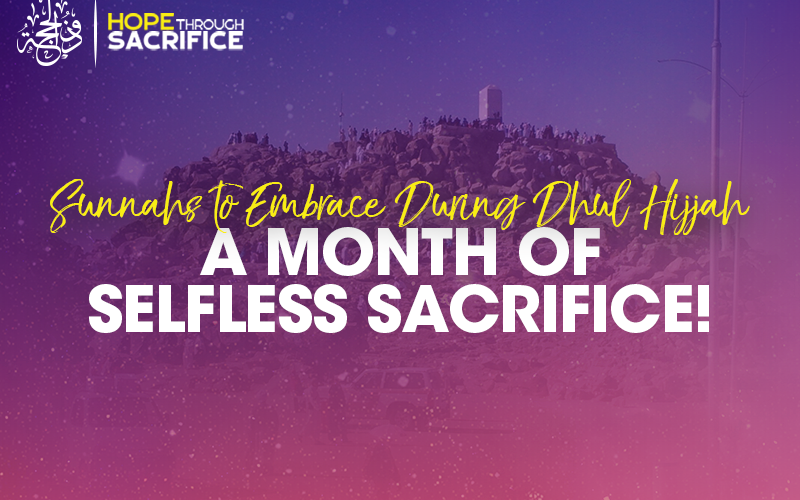The first ten days of Dhul-Hijjah are considered to be the most blessed days of the Islamic calendar. The Prophet (pbuh) said, “There are no days on which righteous deeds are more beloved to Allah than these ten days (ten days of Dhul Hijjah)” (Bukhari). These ten days are filled with immense spiritual importance and offer abundant blessings and rewards for those Muslims who wish to seek them and draw closer to Allah (swt).
In order to reap the benefits of these ten holy days, following are some Sunnah’s you can follow during the blessed period:
- Fasting
One of the highly recommended and revered acts of worship during the first nine days of Dhul-Hijjah is fasting. Fasting on these days, particularly on the Day of Arafah (the 9th of Dhul-Hijjah) brings numerous rewards. The Prophet Muhammad (pbuh) stated, “Fasting on the Day of Arafah expiates the sins of the previous year and the coming year” (Muslim).
- Dhikr
Engaging in constant remembrance of Allah (swt) is a significant and heavily rewarded Sunnah during these days. The Prophet (pbuh) encouraged fellow Muslims to recite “Allahu Akbar” (Allah is the Greatest), “Alhamdulillah” (All praise is due to Allah), and “La ilaha illallah” (There is no god but Allah) regularly. This act of worship not only helps in the purification of one’s heart but also strengthens one’s connection with Allah (swt).
- Performing Voluntary Prayers
In addition to the obligatory prayers, it is highly recommended to perform extra voluntary prayers (nawafil) during the first ten days of Dhul-Hijjah. These include the Sunnah prayers before and after the obligatory prayers and most importantly, the Tahajjud prayer (night prayer). These additional acts of worship bring countless rewards and help one seek Allah’s (swt) mercy and forgiveness.
- Charity and Good Deeds
Engaging in giving Sadaqah and other acts of charity hold great importance during this blessed month. Whether it’s through monetary donations, providing food, or simply offering a helping hand to those in need, every good deed is magnified in reward. The Prophet (pbuh) encouraged increased generosity and kindness during these days as he is recorded to have said, “Sadaqah extinguishes sin as water extinguishes fire” (Timidhi).
- Repent and Make Dua
Supplication (dua’a) is a powerful act of worship, and during these blessed days, it’s important to make sincere and heartfelt dua’a. It is also a good time to cleanse your heart by asking for forgiveness, guidance, and blessings for oneself and others. The days of Dhul-Hijjah are a time when prayers are more likely to be accepted.
- Sacrifice (Qurbani)
For those who can afford it, offering a sacrifice (Qurbani) on the 10th of Dhul-Hijjah (Eid al-Adha) is a highly recommended Sunnah. This act commemorates the willingness of Prophet Ibrahim (pbuh) to sacrifice his son in obedience to Allah’s command. The meat from the sacrifice is distributed among family, friends, and the needy, symbolising charity and sharing.
- Recite Quran
Reciting the Qur’an during the month of Dhul Hijjah is one of the best acts of worship we can perform to draw closer to Allah (swt) and seek His pleasure. The Prophet (saw) said, ‘Whoever reads a letter from the Book of Allah, he will have a reward. And that reward will be multiplied by ten. I am not saying that “Alif, Laam, Meem” is a letter, rather I am saying that “Alif” is a letter, “laam” is a letter and “meem” is a letter’ (Tirmidhi).
- Pray Eid Salah
Eid Salah is one of the ways we show our Islamic identity as a community and is therefore a very important act of worship for all Muslims to partake in. The Prophet (pbuh) always attended Eid Salah, as did his companions after he had passed away. He encouraged everyone to attend, even those who are unable to perform the prayer itself but can still share in the blessings of this gathering.
Following the ways of the Holy Prophet (pbuh) during the first ten days of Dhul-Hijjah can help strengthen your bond with Allah (swt) and bring abundant blessings. These days provide a wonderful opportunity for increased worship, reflection, repentance and acts of kindness. May Allah (swt) grant us the ability to make the most of these sacred days.



